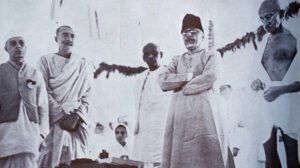
Maulana Abul Kalam Azad: An Educator, Philosopher, Freedom Fighter and More
Twentieth century India has witnessed several stalwarts, who laid the foundation for building modern India. Maulana Abul Kalam Azad was one of the most important among those who transformed the idea of education and its importance in reforming society. An icon of modern-day India’s secular nationalism, Azad’s birthday, November 11, is celebrated as National Education Day.
Azad, along with Jawaharlal Nehru and Sardar Vallabhbhai Patel, laid down the foundations of a secular democratic polity in India. He was not only an educationist, but also a freedom fighter, politician, and journalist in its true sense.
Born in 1888, in Mecca, as Ghulam Muhiyuddin Ahmad, fondly called as Firoz Bakht by his father, he later came to be known as Abul Kalam Azad. In his 10 years in Mecca, he had completed his study of the Quran, the fundamentals of Arabic, Persian and Urdu under the guidance of prominent scholars. He subsequently moved to Calcutta, where he spent the formative years of his life. Under the guidance and discipline of his father, he made extraordinary progress in his studies and completed the Daras-i-Nizamiyah in only four years, taking only one-third of the normal time required to finish it.
He realised that he also required modern learning along with traditional education, and took to learning English through extensive reading. Azad had started writing literary and political journals, poems, and articles from a very early age, in Urdu newspapers. He became a publisher when he was 12 years old, and issued in 1900 Nairange-Alam, a poetic journal.
Maulana Abul Kalam Azad made vital contributions towards the freedom struggle of India against the British rule. He was not only an exceptional and remarkable politician, but also an intellectual and philosopher, who spent several decades speaking and writing about diverse topics, including education. He emerged as one of the distinguished writers during the freedom struggle. As an active writer, he started a weekly Urdu newspaper Al-Hilal with an objective to highlight the colonial oppression of the British within India and outside. The writing expressed in Al-Hilal enhanced the scope of Muslim community engagement with the Indian independence movement. Azad’s writings, like the Tazkira, Tarjumanul Quran, Ghubare Khatir and Khutbade Azad, presented his commentary on religion, philosophy and Islamic history.
His assertion of being identitified as both Indian and Muslim streghthenedthe notion of representation of minorities in the Indian freedom struggle. The following words reflected his distinctive idea of identity and assertion :
“I am a Mulsim and profoundly conscious of the fact that I have inherited Islam’s glorious tradition….. The history and teachings of Islam, its arts and letters, its culture and civilsation are part of my wealth and it is my duty to cherish and guard them…I am equally proud of the fact that I am an Indian…. I can never give up this sincere claim”
This invariably made him part of various movements and agitations associated with the Indian freedom struggle. He was part of the Khilafat and Non-Cooperation Movements and the National Movement, which shook the structure of British rule to it’s very foundations.

Maulana Abul Kalam Azad with Mohandas Karamchand Gandhi, Jawaharlal Nehru, Khan Abdul Gaffar Khan and Sardar Patel at the A.I.C.C. meeting in Delhi. (Image: Getty Images)
In 1923, he was elected President of the Indian National Congress, at it’s Delhi Session, at the age of 35, thereby making him the youngest Congress President to date. He was a fervent advocate of Hindu-Muslim unity. On his election, he said:
“If an angel were to descend from the high heavens and· proclaim from the heights of the Qutab Minar: ‘Discard Hindu-Muslim Unity and within 24 hours Swaraj is yours’, I will refuse Swaraj but will not budge an inch frorm my stand. If Swaraj is delayed it will affect only India, while the end of our unity will be the loss of our entire human world.”
Since India had emerged from 200 years of colonial rule, democratisation of education was of paramount importance to Azad, especially because India had suffered several forms of discrimination and deprivation from centuries. He was deeply aware of the fact that the existing caste and class-ridden education system required a replacement with a system that was just and inclusive. In 1948, while addressing the educational conference in New Delhi, Azad stated,
‘Education, at any rate, must be pushed forward as rapidly as possible. We must not, for a moment, forget that it is the birthright of every individual to receive at least basic education, without which he cannot discharge his duties as a citizen’ (Publications Division, 1989, p. 29, 32).
He was aware that equality in education was not plausible only through an expansion of school education. Adult population, which was considerably large, needed equal and serious attention from the perspective of education. This point highlights that, for him, adult literacy and education were pivotal for the accomplishment of equity-based, comprehensive, and an inclusive education system.
Keeping in mind the age-old practices of prejudice and impoverishment in India, Azad also highlighted the significance of women’s education, most of whom were marginalized. He foresaw that education of women would be beneficial in two ways, firstly, women needed to be educated as citizens of independent India, which would in turn lead to the second benefit, i.e., of facilitating the task of educating younger generations as well.
It was Azad’s persistent endeavour as a minister and as an intellectual to amalgamate Indian and Western ideas into a single, coherent pattern suitable for the newly-emerged independent India. He served as the Minister of Education in Pandit Jawaharlal Nehru’s cabinet from 1947 to 1958. He died of a stroke on February 22, 1958. For his invaluable contribution to the development of modern India, Maulana Abul Kalam Azad was awarded India’s highest civilian honour, Bharat Ratna in 1992.
References:
- Subahash Kashyap , (1989), Maulana Abul Kalam Azad, published by the Lok Sabha Secretariat, New Delhi.
- A. Suroor, The Literary Contribution of Maulana Azad, July- August 1988, Sahitya Akademi – pp- 7-16.
- Rahil Khan, Abul Kalam Azad http://southasia.ucla.edu/history-politics/independent-india/abul-kalam-azad/
- Irfan Habib, 2015, Maulana Abul Kalam Azad and His Ideas about the National Education System, Contemporary Education Dialogue, Sage Publication, pp- 238-257.
- Remembering Maulana Abul Kalam Azad : A short Biography
http://makaias.gov.in/biography.html
(The views expressed in this article are the author’s own. Content can be used with due credit to the author and to ‘Zariya: Women’s Alliance for Dignity and Equality’)

Sana Salim was born and raised in Calcutta. She completed her graduation and master’s from the city and then moved to Pune to pursue her career in information technology. She is currently based out of Düsseldorf, Germany, working as a software developer. She enjoys reading, cooking food for family and friends, travelling, playing board games, and watching Netflix.



